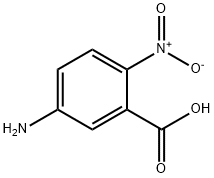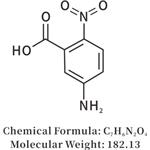Description
5-Amino-2-nitrobenzoic acid is a reagent used in preparation of polymer-bound diazonium salts and insulin receptor tyrosine kinase activator. It is also used in 2-component dendritic chain reactions and activation of hydrophobic dendrimers.
Chemical Properties
5-Amino-2-nitrobenzoic acid appears as a yellow powder or crystal. Its crystal structure is: the 5-amino-2-nitrobenzoic acid crystallizes in the monoclinic P21/c
space group with a = 3.898(2)?, b = 13.531(3)?, c = 14.301(3) ?, and β = 90.83(3)?.
The adjacent molecules form a cyclic dimmer by intermolecular hydrogen bonds of type
O H···O with their carboxyl groups. In the crystal structure NH2 group forms a threecenter hydrogen bond with oxygen atoms of NO2 group.
Uses
5-Amino-2-nitrobenzoic acid can be used as a standard for the determination of γ-GT activity using 5-amino-2-nitrobenzoic acid as a standard. 5-Amino-2-nitrobenzoic acid (ANB) can also be used for spectroscopic studies by determining the FTIR and FT-Raman spectra of ANB in the 400-4000 cm-1 range and calculating the theoretically constructed spectra in good agreement with the experimental spectra.
Uses
Reactant for:
- Two-component dendritic chain reactions
- Enzymic activation of hydrophobic self-immolative dendrimers
- Preparation of insulin receptor tyrosine kinase activator
- Preparation of polymer-bound diazonium salts using Merrifield resin-bound piperazine
Application
5-Amino-2-nitrobenzoic acid is a drug that has been shown to inhibit the activity of proteases. It has been used to detect the presence of protease activity in urine samples, as well as to study the inhibition of protease activity by other drugs. It is an inhibitor of chymotrypsin, trypsin, and elastase. This drug has been shown to be effective in inhibiting these enzymes at low concentrations, with a detection sensitivity of approximately 0.1 μM. It inhibits the growth of bacteria by binding to them and preventing protein synthesis. The compound also inhibits the enzyme dihydrolipoamide dehydrogenase in mitochondria, which is required for cellular respiration and energy production.
reaction suitability
reaction type: solution phase peptide synthesis
Purification Methods
Crystallise the acid from water. [Beilstein 14 III 1021.]



